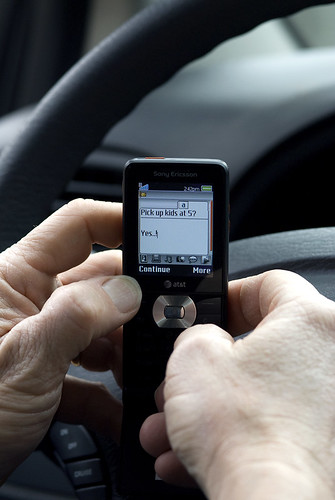“License, registration and cell phone please.” If that last part sounds a little strange, well, you may just have to get used to it – if New Jersey’s latest proposed distracted driving legislation is a sign of things to come, that is.

A bold new distracted driving bill
New Jersey state Senator James Holzapfel has proposed a bill that would allow police officers to confiscate drivers’ cell phones post-car accident if they have reasonable grounds to believe the driver was distracted by talking or texting on the phone at the time of the wreck. The police would have to return the device after reviewing its history.
Are cell phones to blame?
The bill is aimed at cutting down on distracted driving, which U.S. Transportation Secretary Ray LaHood said was responsible for killing 3,000 people and injuring 387,000 in 2011. Although distractions such as billboards, scenery and eye candy have long been known to take drivers’ eyes off the road, new technologies like GPS units, iPods, and, of course, cell phones take drivers’ hands off the wheel as well. Experts say that many of these devices also engage drivers’ minds so that they are less able to pay attention to driving.
While distracted driving is often suspected as being to blame for many car accidents, it can be difficult to prove. Anne McCartt from the Insurance Institute for Highway Safety claims police reports are not a reliable source of information regarding the cause of distracted driving wrecks, as the cause is often not reported, and there are wide variations across states. She says the best studies rely on phone records to conclude whether drivers were using their phones when the accident occurred.
Safety at the cost of privacy?
Eleven states already ban drivers from talking on hand-held devices, and 41 states have laws in place against texting while driving. While New Jersey’s proposed bill aims to make distracted driving easier to prove, some concerned residents see it as a gross invasion of privacy.
The American Civil Liberties Union of New Jersey has already made its concerns with the bill known. The main legal issue? State and Federal constitutions typically do not authorize a search without probable cause, especially regarding areas containing highly personal information, such as cell phones. Because of this, the ACLU-NJ foresees a constitutional challenge to the proposed bill.
Do you feel that you have been subject to an unlawful search? If so, contact the best criminal lawyer in Las Vegas, Gabriel Grasso, at (702) 868-8866 to schedule a free consultation.
Main photo by OregonDOT
